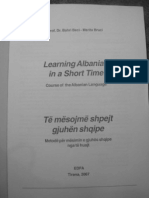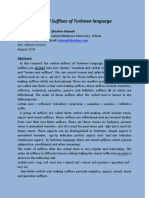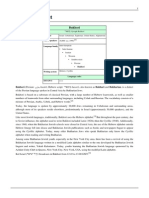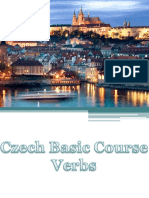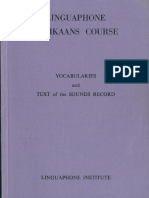Bukharian Jewish
Language
Zaboni Yahudihoyi Buxori
�ALPHABET
Corresponding letters and sounds
Latin Letters
English Letters
(Bukharian)
Russian
Hebrew
letters
letters
Aa
Bb
Vv
Gg
Dd
Ee
..
Yo yo
YO
Zh zh
ZH
Zz
Ii
Yy
Kk
Ll
Mm
Nn
Oo
Pp
�Rr
Ss
Tt
Uu
Ff
Hh
soft sounding H
Ch ch
CH
Sh sh
SH
'
sign for separation of
letters
Ee
Yu yu
YU
Ya ya
YA
U' u'
Qq
pronounced as sound of
"ea" in word "early"
pronouced as "c" in
word "consonant"
pronounced as sound
Gh gh
"gh" in word
"Afghanistan"
Xx
hard sounding H
Jj
Note:
The letter of H should be pronounced softer than usual English h, while
letter X should be pronounced harder than usual English h.
For example:
�Hayim - the life
Xursand - Merry, happy
The letter U' should be pronounced as letters ea in the English word early.
The letter Q should be pronounced as "c" in English word "consonant".
LESSON ONE
The cardinal numbers.
1. one - yak
2. two - du
3. three - se
4. four - chor
5. five - panj
6. six - shish
7. seven - haft
8. eight - hasht
9. nine - no'h
10. ten - dah
11. eleven - yozdah
12. twelve - duvozdah
13. thirteen - senzdah
14. fourteen - chordah
15. fifteen - ponzdah
16. sixteen - shonzdah
�17. seventeen - habdah
18. eighteen - hastdah
19. nineteen - no'zdah
20. twenty - bist
21. twenty one - bistu yak
30. thirty - si
31. thirty one- siyu yak
40. forty - chil
50. fifty - panjoh
60. sixty - shast
70. seventy - haftod
80. eighty - hashtod
90. ninety - navad
100. hundred - sad
200. two hundred - dusad
300. three hundred - sesad
400. four hundred - chorsad
500. five hundred - panjsad
600. six hundred - shishsad
700. seven hundred - haftsad
800. eight hundred - hashtsad
900. nine hundred - no'hsad
1000. thousand - hazor
1000000. million - milion
The ordinal numbers.
The ordinal numbers are derived from the cardinal numbers with the
addition of the suffix - to words ending with consonants "-um" ; - to words
ending with vowels "-yum":
�yakum - first
duyum - second
seyum - third
chorum - fourth
panjum - fifth
bistu seyum - twenty third
sadu navadu haftum - one hundred and ninety seventh
Fractions.
Example:
Az chor se - three quarters (three fourths)
Az se du - two thirds
�Home work. Write the following words in Buxori:
Sixty one (61)
Twenty two (22)
Eighth (8th)
One hundred ninety fifth (195th)
Two fourth (2/4)
LESSON TWO
In the Bukharian-Jewish language as in other languages, there are words,
letters in which pronounce differently, than are written. For a correct
pronunciation of the words in the Bukharian-Jewish language, difficult
words will be written in a transcription. In many cases the letter h doesnt
pronounce at the end of the words, for example:
no'h [no] nine
dah [da] ten
yozdah [yoza] eleven
duvozdah [doza] twelve
senzdah [senza] thirteen
chordah [chorda] fourteen
ponzdah [ponza] fifteen
shonzdah [shonza] sixteen
habdah [habda] seventeen
�hashtdah [hashda] eighteen
nuzdah [nuzda] nineteen
panjoh [panjo] fifty
Learn the following words:
Yakshanbe [yakshame] Sunday
Dushanbe [dushame] Monday
Seshanbe [seshame] Tuesday
Chorshanbe [chorshame] Wednesday
Panjshanbe [panshame] Thursday
Jum`a Friday
Shabot Saturday
Roz day
Hafta week
Moh month
Sol year
Imroz today
Pagah tomorrow
Dina yesterday
Imroz shabot today is Saturday
Imroz yakshanbe today is Sunday
It is necessary to note, that some Bukharian Jews use the following
words for days of week:
Yakshabot Sunday
Dushabot Monday
Seshabot Tuesday
�Chorshabot Wednesday
Panjshabot Thursday
Rozi erev-shabot Friday
Shabot Saturday
Homework
Write down the following words:
Today is Monday
Today is Tuesday
Today is Wednesday
Today is Thursday
Today is Friday
Answers to the homework of the first lesson:
Sixty one (61) - Shastu yak
Twenty two (22) - Bistu du
Eighth (8th) - Hashtum
One hundred ninety fifth (195th) - Sadu navadu panjum or yak sadu
navadu panjum
Two fourth (2/4) - Az Chor Du
�LESSON 3
Learn the following words:
Mishpoho, oila - family
Dada - dad
Ocha, ona - mom
Padar father (lit.)
Modar mother (lit.)
Bobo [bovo] - grandfather
Bibi [bivi] - grandmother
Bacha, farzand a child
Pisar son, boy
Duxtar daughter, girl
Barodar brother
Aka older brother
Dodar, uka younger brother
Apa older sister
Xohar [xuvar] younger sister
Nabera [navera] grandson, granddaughter
Amak uncle (from fathers side)
Taghoi uncle (from mothers side)
Amma aunt (from fathers side)
Xola aunt (from mothers side)
Hover, dost, jora friend
Kitob [kitov] book
�Pronouns
Pronoun is the part of speech which is not naming a subject, but indicates
it. The structure of independent personal pronouns of the Bukharian-Jewish
language is resulted below:
Man Im
Tu - you
Shumo you (polite form)
Mo - we
O, hamo he, she
Onho - they
In the pronouns designating of belonging, we are using suffix i
-i man my
-i tu your
-i o his, her
-i mo - our
-i shumo yours (polite form)
-i onho - their
Example:
My friend hoveri man
My book kitobi man
Their friend hoveri onho
His/her friend hoveri o
Your friend hoveri tu
Yours friend hoveri shumo
�Possession
Possession is expressed in one of two ways:
a) by adding a set of possessive endings to the noun representing the thing
possessed.
b) by relating the possessor and the thing possessed by means of an ezafe.
Thos lesson deals with these two forms of expressing possession.
Possession by adding possessive endings
To form the possessive form of noun, add the following endings to it.
These endings can be attached to any noun that ends in a consonant.
Example:
My son pisar + am = pisaram
Your son pisar + at = pisarat
His/her son pisar + ash = pisarash
Your son (pl. or sing., polite) pisarat + on = pisaraton
Their son pisar + ashon = pisarashon
If the noun ends in a vowel, add yam at the and. Example:
Onayam [onim] my mom
Dadayam [dadim] my dad
Bibiyam [bivim] my grandmother
Boboyam [bovom] my grandfather
Learn a proverb:
Dili modar ba farzand,
Dili farzand ba xorsang
�In translation means:
Heart of mother to the child,
Heart of child to the stone
Used in case, when the child does not care about his/her mother, in time,
when heart of the mother thinks about her child.
Homework
Write down the following words:
My daughter
Their daughter
His/her daughter
Your daughter
Your daughter (pl. or sing., polite)
My family
Their family
His/her family
Your family
Your family (pl. or sing., polite)
�The answers to the homework of the second lesson:
Today is Monday - Imro'z Dushanbe (imro'z dushabot)
Today is Tuesday - Imro'z Seshanbe (imro'z seshabot)
Today is Wednesday - Imro'z Chorshanbe (imro'z chorshabot)
Today is Thursday - Imro'z Panjshanbe (imro'z panjshabot)
Today is Friday - Imro'z Jum`a (imro'z rozi erev shabot)
LESSON FOUR
Review lessons ## One, Two, and Three before studying this lesson.
Review Alphabet Table, if necessary.
Learn the following words and phrases:
Sholum hello.
Sholum `alexem! peace for you! (form of greeting)
Va `alexem sholum! answering form to the Sholum `alexem! with
the same meaning.
Borux habo; xush omaded welcome (polite form).
Naghzed?; Naghz hasted? are you all right? (polite form)
Chitued shumo? how are you? (polite form)
Sihat hasted?; Salomat hasted? how do you feel? (polite form)
Chi gapi toza whats new?
�Chi tu shud? what happened?
Borux Hashem!; Xudoba shukr! [shukur] Thanks God!
Man naghz hastam; Man naghz; naghzam Im all right.
Salomatiyam [salomatim] naghz (Salomatiyi man naghz) I feel good.
Salomatiyam [salomatim] naghz nest I dont feel well.
Shumoro dida xursand shudam nice to meet you (polite form).
Rahmat; quluq thanks.
Sihat [shat] boshed; Sihat-salomat boshed feel well; be healthy (polite
form).
Xayr, salomat boshed; naghz moned Goodbye.
Xudo; Hashem - God
Sihat salomat; tani-sihat - health
Naghz; xub good, nice
Bad - bad
Hov - yes
Ne no
Nest - not
Insun; injo here
Unsun; unjo - there
In, hamin this
Inho these
Vay; hamun that
The Verb
The verb is the most difficult part of the speech, which may express an act,
an occurrence, or a mode of being. Below are some examples of verbs. The
an- at the end of each verb is called the infinitive marker and is similar
in function to the English infinitive to in the verb to go. The table
�below shows the verbs in infinitive form in Bukharian-Jewish language,
then base of the verb in present tense and its meaning in English.
Infinitive in Bukharian
Base
Meaning
Donistan-an
- don -
to know (a thing)
Girift - an
- gir -
to take
Guft - an
- guy -
to say
Shinoxt- an
- shinos -
to know (a person)
Tavonist- an
- ton -
can
Simple Present Tense
This tense refers to an action that is happening now, or one that will happen
soon in the future. To form this tense you need to:
a) take the base of the verb;
b) add prefix me- to the present stem (beginning of the verb).
c) add verb endings -am or -yam; -i or -yi; -ad or -yad; -em
or -yem; -eton or -yeton; -and or -yand.
Notice:
The verb guftan in Present tense has base -guy-, but when it using in a
sentence, last letter of the base -y goes out. See the example.
�How to use the verb endings:
Use -am or -yam to noun I; (If the noun ends in a vowel add
yam at the end, if in a constant add -am).
Example:
Man meguyam I say; Man medonam I know.
Use -ed or -yed to noun you (polite form), (If the noun ends in a
vowel add yed at the end, if in a constant add -ed).
Example:
Shumo medoned you (polite) know; shumo meguyed You (polite) say;
Use -i or -yi to noun you (single), (If the noun ends in a vowel add
yi at the end, if in a constant add -i).
Example:
Tu medoni You know; tu meguyi you say.
Use -and or yand to noun we (If the noun ends in a vowel, add
yand at the end, if constant add -and).
Example:
Onho medonand They know; Onho meguyand They say
Use -eton or -yeton to noun you (plural), (If the noun ends in a
vowel add yeton at the end, if in a constant add -eton).
Example:
Shumo medoneton you (pl.) know; shumo meguyeton you (pl.) say.
Use -em or -yem to noun we, (If the noun ends in a vowel add
yem at the end, if in a constant add -em).
Example:
Mo medonem we know; mo meguyem we say.
�For negative form of the verb, add na- before prefix me- Example:
Man namedonam I dont now.
Example:
Affirmative form
Negative form
Man me-guyam I say
Tu meguyi You (sing.) say
Man name-guyam I dont say
U meguyad He/she says
Tu nameguyi You (sing.) dont say
Mo meguyem We say
U nameguyad He/she doesnt say
Shumo meguyed You (polite) say
Mo nameguyem We dont say
Shumo meguyeton You (plural) say
Shumo nameguyed You (polite) dont say
Onho meguyand They say
Shumo nameguyeton You (plural) dont say
Onho nameguyand They dont say
Man medonam I know
Tu medoni You (sing.) know
Man namedonam I dont know
U medonad He/she knows
Tu namedoni You (sing.) dont know
Mo medonem We know
U namedonad He/she doesnt know
Shumo medoned You (polite) know
Mo namedonem We know
Shumo medoneton You (pl.) know
Shumo namedoned You (pol.) dont know
Onho medonand They know
Shumo namedoneton You (pl.) dont know
Onho namedonand They dont know
Man meshinosam I recognize
Tu meshinosi You recognize
Man nameshinosam I recognize
U meshinosad He/she recognizes
Tu nameshinosi You (sing.) dont recognize
Mo meshinosem We recognize
U nameshinosad He/she doesnt recognize
Shumo meshinosed You (polite) recognize
Mo nameshinosem We dont recognize
Shumo meshinoseton You (plural)
Shumo nameshinosed You (polite) dont recognize
recognize
Shumo meshinoseton You (plural) dont recognize
Onho nameshinosand They dont recognize
�Onho meshinosand They recognize
Learn the proverb:
Raftan ba dasti xud,
Omadan ba dasti Xudo
Translation:
To go by own hands,
To come by hands of God
Using in case, when somebody goes somewhere, but no one knows whether
the person will come back safely.
Learn the byword:
Padar rozi, modar rozi Xudo rozi
Translation:
When the parents agree God agrees
Read the dialogue below:
Pinhos (mans name)
Rohel (womans name)
�Rohel: Sholum aka Pinhos! Naghzed? Chitoed shumo? Sihat- salomat
hasted?
(Hello Mr. Pinhos! Are you all right? How are you? How do you feel?)
Pinhos: Sholum apa Rohel! Borux Hashem, man naghz hastam.
Chi gipi toza?
(Hello Ms. Rohel! Thanks God, Im all right. Whats new from you?)
Rohel: Man, Xudoba shukr ruzi yakshanbe tfilin-bandoni pisaramro
guzarondam.
(Thanks God, on Sunday I celebrated Bar-Mitzvah of my son.)
Pinhos: Bisyor nagz. Man hursand hastam ki shumoro didam.
(Very good. Im glad to see you).
Rohel: Hayr, naghz moned!
(Goodbye!)
Pinhos: Naghz raved!
(Goodbye).
�Homework:
Write down next phrases in Present Tense with verb giriftan (to take),
which base is -gir- and with verb tavonistan (can), which base is -ton(Look at the examples if necessary):
I take;
I dont take;
You take;
You (sing.) dont take;
He/she takes;
He/she doesnt take;
We take;
We dont take;
You (polite) take;
You (polite) dont take;
You (plural) take;
You (plural) dont take
They take;
They dont take;
I can;
I cant;
You can;
You cant;
He/she can;
He/she cant;
We d can;
We cant;
You (polite) can;
You (polite) cant;
You (plural) can;
You (plural) cant;
They can.
They cant.
The answers to the homework of the Third lesson are:
My daughter: Duxtari man / Duxtaram
Their daughter: Duxtari onho / Duxtarashon
�His/her daughter: Duxtari u' / Duxtarash
Your daughter: Duxtari tu / Duxtarat
Your daughter (polite): Duxtari shumo / Duxtaraton
My family: Oilayi man, Mishpohoyi man / Oilayam, Mishpohoyam
Their family: Oilayi onho, Mishpohoyi onho / Oilayashon,
Mishpohoyashon
His/her family: Oilayi u', Mishpohoyi u' / Oilayash, Mishpohoyash
Your family: Oilayi tu, Mishpohoyi tu / Oilayat, Mishpohoyat
Your family (polite): Oilayi shumo, Mishpohoyi shumo / Oilayaton,
Mishpohoyaton
LESSON FIVE
Learn the following words:
Zamiston winter;
Bahor spring;
Tobiston summer;
Tiramoh autumn, fall;
Yanvar January;
Fevral February;
Mart March;
Aprel April;
May May;
Iyun June;
�Iyul July;
Avgust August;
Sentyabr September;
Oktyabr October;
Noyabr November;
Dekabr December;
Obu havo weather;
Xunuk cold;
Salqin cool;
Garm warm, hot;
Aver; havo air;
Barf snow;
Boron rain;
Osmon; shomaim sky;
Oftob Sun;
Mahtob Moon;
Sitora star, planet;
Ruz day;
Imruz today;
Aknun; hozir now, soon;
So`at time, watch, clock;
Nom name;
Familiya last name.
Now is a summer hozir tobiston hast;
What is the month now? - Hozir kadom moh hast?
Now is June Hozir Iyun hast;
Now is September Hozir sentyabr hast;
�What is the time? So`at chand shud?
The time is three oclock and 15 minutes so`at seyu ponzdah minut
shud;
The time is two oclock and 35 minutes so`at duyu siyu panj minut
shud.;
The time is eleven oclock so`at yozdah shud;
The weather is hot today imruz havo garm;
The weather is cool today imruz havo salqin;
The weather is good today imruz havo naghz;
The weather is not bad today imruz havo bad nest;
What is your name? Nomi tu chi hast? (Nomat chist?) (sing.)
Nomi shumo chi hast? (Nomaton chist) (respectful)
My name is Pinhos Nomi man Pinhos hast (Nomam Pinhos hast)
How old are you? Shumo chand sola shuded? (respectful)
Tu chand sola shudi? (sing.)
Im twenty two years old Man bistu du sola shudam;
Im eighteen years old Man hazhdah sola shudam.
Infinitive in Bukharian
Shud -an
Homework:
Base
-shud-
Meaning
to become
�Write down the following words and phrases:
Now is October;
Now is April;
Now is autumn (fall);
The weather is cold today;
Im fifteen years old;
Im thirty five years old;
The time is five oclock and 20 minutes;
The time is seven oclock and 10 minutes;
The answers to the homework for the fourth lesson:
I take man megiram;
You take tu megiri;
He/she takes u megirad;
We take mo megirem;
You (polite) take shumo megired;
You (plural) take shumo megireton;
They take onho megirand;
I can man metavonam;
You can tu metavoni;
He/she can u metavonad;
We can mo metavonem;
You (polite) can shumo metavoned;
You (plural) can shumo
metavoneton;
They can onho metavonand.
I dont take man namegiram;
You (sing.) dont take tu namegiri;
He/she doesnt take u namegirad;
We dont take mo namegirem;
You (polite) dont take shumo namegired;
You (plural) dont takeshumo namegireton;
They dont take onho namegirand;
I cant man nametavonam;
You cant tu nametavoni;
He/she cant u nametavonad;
We cant mo nametavonem;
You (polite) cant shumo nametavoned;
You (plural) cant shumo nametavoneton;
They cant onho nametavonand.
�LESSON SIX
Learn the following words:
Meva fruit;
Sabzavot vegetable;
Seb [sev] apple;
Noshpoti pear;
Olu plum;
Olucha cherry;
Gelos sweet cherry;
Angur grape;
Anjir fig;
Tut mulberry;
Shaftolu peach;
Anor pomegranate;
Xurmo date;
Tarbuz watermelon;
Xarbuza melon;
�Kadu pumpkin;
Kartoshka potato;
Piyoz onion;
Sabzi carrot;
Mandura; pomidor tomato;
Bodaring cucumber;
Karam cabbage;
Alafi osh coriander;
Lablabu [lablavu] beetroot;
Shalgham turnip;
Turbcha radish;
Lubiyo bean;
Colors:
Rang color;
Surx red;
Sub-surx very red;
Zard yellow;
Zab-zard very yellow;
�Kabud [kavud] green; blue;
Osmonrang blue;
Kap-kabud very green; very blue; dark-blue;
Jigarrang brown;
Xokistarrang gray;
Siyoh [siyo] black;
Sip-siyoh very black;
Safed white;
Sab-safed very white;
Maza- taste;
Bamaza tasteful;
Bemaza not tasteful;
Shirin sweet;
Talx bitter;
Shur salty;
Fach insipid;
Turush sour;
Chand? how much?
�Chandta? how many?
Infinitive in
Bukharian
Doshtan
Base
Meaning
-dor-
to have; to own
The verb doshtan is an exception to the me- rule which we add in the
Present tense. Therefore, to form the present tense of this verb, you should
add the endings of the Present base; no me- is required. To form the
negative, add na- as usual directly to the base.
For example:
Positive form
Negative form
Man doram I have;
Man nadoram I dont have;
Tu dori You have;
Tu nadori You dont have;
Shumo dored You (resp.) have;
Shumo nadored You (resp.) dont have;
U dorad He/she has;
U nadorad He/she hasnt
Mo dorem We have;
Mo nadorem We dont have;
Shumo doreton You have (pl.);
Shumo nadoreton You dont have (pl.);
Onho dorand They have
Onho nadorand They dont have
Red apple sebi surx;
Yellow pear noshpotiyi zard;
White onion piyozi safed;
Not sweet watermelon tarbuzi bemaza;
Sour plum oluchayi turush;
�Sweet peach shaftoluyi bamaza;
I have five sweet apples man panjta sebi shirin doram;
I have two very red sweet apples man duta sebi sub-surx doram;
Classifiers
For counting things which come in books, fruits, or other things,
Bukharian uses classifiers. These classifiers follow the numeral and
precede the noun. In most cases we use unspecified unitizer -ta, which
we add to the numeral.
Example:
Yakta seb one apple;
Duta anor two pomegranates;
Yakta kitob one book;
Seta angur three grapes;
Chorta noshpoti four pear;
Learn the proverb:
Kayvonu du shud, osh shur shud.
Two cooks start to cook, the dinner became salty.
The proverb means that for every business there should be one chairman.
The questions for example:
Tu chandta kitob dori?
The answers for example:
Man seta kitob doram I have three books.
�How many books do you have?
Shumo chandta kitob dored?
How many books do you have? (respectful)
U chandta kitob dorad?
U seta kitob dorad He/she has three books.
How many books does he/she have?
Mo seta kitob dorem We have three books.
Shumo chandta kitob doreton?
Onho seta kitob dorand They have three books.
How many books do you have? (plural)
Onho chandta kitob dorand?
How many books do they have?
Homework:
Write down the following sentences in Bukhori:
How many pears do you have?
How many cucumbers does he/she have?
How many plums do they have?
I have three very-yellow pears.
He/she has three tomatoes.
We have three pears.
They have three sweet-cherries.
�The answers to the homework for the fifth lesson:
Now is October;
Xozir mohi oktyabr hast;
Now is April;
Xozir mohi aprel hast;
Now is autumn (fall);
Hozir tiramoh hast;
The weather is cold today;
Imruz havo xunuk;
Im fifteen years old;
Man ponzdah sola shudam;
Im thirty five years old;
Man siyu panj sola shudam;
The time is five oclock and 20
minutes;
So`at panju bist minut shud;
The time is seven oclock and 10
So`at haftu dah minut shud.
minutes.
LESSON SEVEN
Learn the following words:
Hoton; domod groom; son in law;
Kelin daughter in law;
Shavhar; shu husband;
Hamsar; zan wife;
Kalo; `arus bride;
�Padarshu father in law (husbands father);
Modarshu mother in law (husbands mother);
`Amak father in law (wifes father); uncle (brother of the father);
Ochamo mother in law (wifes mother);
Dodarshu- husbands brother;
Xoharshu[xuvarshu] husbands sister;
Dodar`arus wifes brother (brother in law);
Xohar`arus wifes sister (daughter in law);
Boja two husbands of two sisters;
Daghech two wifes of two brothers;
Yazna husband of the aunt or sister;
Tuti wife of the brother; aunty (addressing to any older women)
`Abera[`avera] great-grandson;
Farnabera [farnavera] great-great grandson;
�Questions:
Ki? who?
Chi? what?
Kay? when?
Kadom? which?
Chuva? Charo? (lit.) why?
Baroyi ki? for whom?
Baroyi chi? for what?
Chi xel? how?
Chand? how much?
Chandta? how many?
Qani? Kujo? where?
Az kujo? where from?
Infinitive in Bukharian
Budan
Didan
Dodan
Doshtan
Furuxtan
Kardan
Omadan
Ovardan
Raftan
Present Base
-hast-bin-tiy-; -deh-(lit.)
-dor-furush-kun-biyo-biyor-rav-
Meaning
to be
to see
to give
to have; to own; to catch
to sell
to do; to make
to come; to arrive
to bring
to go
�Shudan
Xaridan
Xondan
Xurdan
-shav-xarid-xon-xur-
to become
to buy
to read; to sing
to eat
As we discussed already in Lesson Three the suffix i, or yi is used to
connect a noun with an adjective. In Bukhori, adjectives usually follow the
noun.
For example:
Apple seb + red surx = red apple sebi surx.
Plum olu + yellow zard = yellow plum oluyi zard
The pronouns may be used after a noun with the possessive suffix -i or
-yi.
For example:
My mother modari man
My grandfather boboyi man.
�Past Indefinite Tense (Simple Past)
The Simple Past tense indicates that an activity or situation began and
ended at a particular time in past.
To form a Simple Past tense you need to:
a) take an infinitive verb and take out its infinitive ending an;
For example: to see didan did; to give dodan dod.
b) add needed verb ending -am or -yam; -i or -yi; -ed or -yed,
-em or -yem; -eton or -yeton; -and or -yand.
For negative form of the verb, add na- before the verb.
Example:
Affirmative form
Negative form
Man dodam I gave;
Man nadodam I didnt give;
Tu dodi you gave;
Tu nadodi you didnt give;
U dod he/she gave;
U nadod he/she didnt give;
Mo dodem we gave;
Mo nadodem we didnt give;
Shumo doded you gave (polite);
Shumo nadoded you didnt give (polite);
Shumo dodeton you gave (pl.);
Shumo nadodeton you didnt give (pl.);
Onho dodand they gave.
Onho nadodand they didnt gave.
Man xaridam I bought;
Man naxaridam I didnt buy;
Tu xaridi you bought;
Tu naxaridi you didnt buy;
�U xarid he/she bought;
U naxarid he/she didnt buy;
Mo xaridem we bought;
Mo naxaridem we didnt buy;
Shumo xarided you bought (polite);
Shumo naxarided you didnt buy (polite);
Shumo xarideton you bought (pl.);
Shumo naxarideton you didnt buy (pl.);
Onho xaridand they bought.
Onho naxaridand they didnt buy.
Note: In the conversation Bukharian Jews use ending ak in the Past
Tense to the verb following the noun he/she. For example: He/she came
U omadak.
Ki omad? who came?
Chi gufted? what did you say? (resp.)
Kay omaded? when did you come?
Kadom meva ovarded? which fruit did you bring?
Chuva gufted? why did you say?
Baroyi ki ovarded? for whom did you bring?
Baroyi chi karded? for what did you do?
Chi xel omaded? how did you come?
Chand pul doded? how much money did you give?
Chandta meva xarided? how many fruits did you buy?
Kujo rafted? where did you go?
�Az kujo omaded? where from did you come?
Learn the proverbs:
Bukharian Proverbs
English Translation
Daraxti kach rost nameshavad, As crooked tree will not be straight, a
modarshu ba kelin dust
husbands mother will not be friend of
nameshavad.
the daughter in law.
Everything what you do, you do for
Har chi kuni ba xud kuni, xoh
nek kuni xoh bad kuni.
yourself, and it doesnt matter that its
good or bad.
Read the dialogue
Rahamim mens name;
Hizqiyo mens name.
Rahamim: Ha, mulo Hizkiyo, sholom! Chituyed shumo? Man
shumoro du sol nadidam.
(Hey, Mr. Hizqiyo, hello! How are you? I didnt see you for two years.)
Hizqiyo: Sholum, mulo Rahamim! Man naghzam. Borux Hashem yak
moh pesh zan giriftam. Hozir man zanam qati meshinam.
(Hello Mr. Rahamim. Im good. Thanks God I got married one month ago.
Now I live with my wife.)
Rahamim: Mazoltuv, man nafahmidam-ku. Zanaton az kadom avlod
hastand?
(Congratulation, I didnt know that. From which clan is your wife?)
�Hizqiyo: Zanam az avlodi Moshe Kalontar, nomi u Yashu`o hast.
(My wife is from the family of Moshe Kalontar, her name is Yushuo.
Rahamim: xay-xay, man zanatonro meshinosamku. U duxtari Dovidi
Kalontar va Shushanoyi Mulloqand hast. Onho odamshavanda
hastand.
(Wow, I know your wife, She is a daughter of David Kalontar and
Shoshana Mulloqand. They are respectful people.)
Hizqiyo: Hov, emet gufted. Xayr, chi gaphoyi toza?
(Yes, thats right. Ok. whats new?
Rahamim: Man naghz hastam, Xudoba shukr. Yak sol pesh zan
giriftam az avlodi Aharoni Qandin. Nomi u Davuro. Yakta pisar
doram Ariel.
(Im good, thanks God. I got married a year ago. She is from the family of
Aharon Qandin. Her name is Debora. I have a son Ariel.)
Hizqiyo: Basimontuv! Elohim pisaraton baxtnok shavad!
(Congratulation! May your son be happy!)
Rahamim: Rahmat, salomat boshed!
(Thanks, be well.)
�Homework:
Write down the following sentences in Bukhori:
I came; I didnt come
You came; you didnt come (resp.)
You came; you didnt come (pl.)
He/she came; he/ she didnt come;
They came; they didnt come.
I went; I didnt go;
You went; you didnt go (resp.);
You went; you didnt go (pl.)
He/she went; he/she didnt go;
They went; they didnt go.
The answers to the homework for the sixth lesson:
How many pears do you have? Shumo chandta noshpoti dored?
How many cucumbers does he/she have? U chandta bodaring dorad?
How many plums do they have? Onho chandta olu dorand?
I have three very-yellow pears Man seta noshpotiyi zab-zard doram.
�He/she has three tomatoes U seta mandura dorad.
We have three pears Mo seta noshpoti dorem.
They have three sweet-cherries Onho seta gelos dorand.


